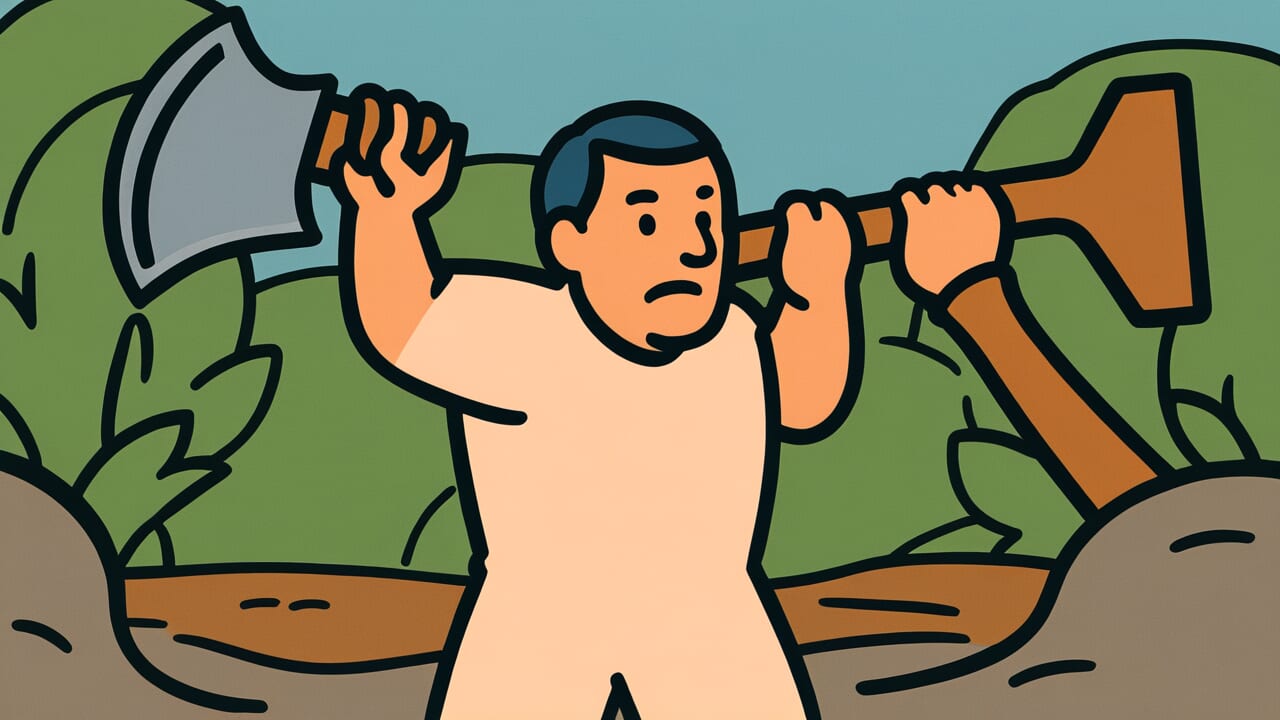How to Read “Unexpected luck is an axe that cuts down one’s nature”
Gyōkō wa sei wo tatsu no ono nari
Meaning of “Unexpected luck is an axe that cuts down one’s nature”
This proverb warns that relying on chance luck is dangerous. It can damage your essential character.
Fortune gained without effort makes people lazy and arrogant. It causes them to overestimate their abilities.
The character you should be developing gets cut down by luck, like an axe felling a tree.
People use this proverb to warn against depending too easily on luck. For example, it applies to someone seeking a quick turnaround without building real skills.
It also fits those who hope for windfall success. Today, betting your life on lottery tickets or always seeking easy paths shows this attitude.
Such approaches stop your growth. They make you lose your appeal as a person.
True success only comes from steady, accumulated effort. This is a harsh but honest teaching.
Origin and Etymology
The exact source of this proverb has several theories. Most likely, it comes from Chinese classical thought, especially Confucian ideas about virtue-based governance.
“Gyōkō” means unexpected luck or fortune. “Sei” refers to human nature or character. “Tatsu” means to cut down, and “ono” is an axe for cutting trees.
The structure creates a striking metaphor. Gaining luck becomes an axe that cuts down character.
Why compare luck to a tool that destroys character? The insight is deep. Fortune gained without effort makes people arrogant.
It causes them to neglect self-improvement. Eventually, it erodes their humanity.
Confucianism emphasized building virtue and character through effort. Relying on chance luck was seen as dangerous.
It meant straying from the path of self-cultivation. The powerful image of an axe shows how something seemingly good can be terrifying.
Luck appears beneficial at first. But it actually cuts down the precious tree of character at its roots.
After reaching Japan, this teaching was preserved within samurai culture and the value placed on diligence.
Usage Examples
- He got carried away after one big win, but unexpected luck is an axe that cuts down one’s nature—he stopped trying and lost everyone’s respect
- Don’t mistake accidental investment profits for real skill; unexpected luck is an axe that cuts down one’s nature, after all
Universal Wisdom
The universal wisdom in this proverb is a harsh truth. Human growth always requires hardship and effort.
Why do people seek luck? Because we have an instinct to take the easy path. But our ancestors saw through this.
They understood that seeking ease leads to moral decline.
Things gained without effort don’t teach gratitude. Success obtained without struggle doesn’t teach humility.
Chance luck makes you confuse your real ability with fortune. Gradually, it creates an arrogant person.
Most frightening of all, people who get used to luck lose the very ability to make effort.
The tree of character grows strong and thick through daily effort, like water. It needs the wind and rain of hardship as trials.
But the axe of luck has the power to cut down that growth instantly. Why? Because once people taste ease, they can never return to the path of struggle.
This proverb has been passed down for so long because every era has people who chase luck and lose their character.
Human nature hasn’t changed in thousands of years. That’s why this warning still resonates with us today.
When AI Hears This
Accidental success triggers two cognitive biases in the human brain simultaneously. First, prospect theory shows that people become less sensitive to risk after gaining profit.
For example, someone who accidentally receives 1 million yen thinks, “I already made money, so some loss is okay.” They take dangerous bets they would normally avoid.
Kahneman’s research confirmed that subjects’ loss aversion instinct drops by over 30 percent right after gaining profit.
Even more troublesome is the combined effect with the hot hand fallacy. When basketball shots go in repeatedly, players feel “I’m on fire today.”
Similarly, people mistake accidental success for real ability. Lottery winners who believe “I’m lucky” and keep buying tickets show exactly this phenomenon.
In reality, each drawing’s probability is completely independent. But the brain creates causal relationships anyway.
When these two combine, it becomes terrifying. Accidental success numbs risk perception. Simultaneously, mistaking it for ability leads to repeated destructive challenges.
Brain imaging studies of gambling addicts reveal something disturbing. Early winning experiences suppress prefrontal cortex judgment functions long-term.
In other words, accidental luck is an axe that breaks the brain’s safety mechanisms themselves.
Lessons for Today
This proverb teaches modern people that true happiness is something you build with your own hands.
You might feel envious seeing people become famous overnight on social media. Or those who accidentally gain wealth through investments.
But without the process of effort leading there, they won’t develop the power to maintain that success. They won’t build the ability to create the next success either.
If you’re continuing steady effort right now, it’s never wasted. Rather, each step is making you stronger, deeper, and more attractive as a person.
Don’t wait for luck. Polish your real abilities instead. Don’t search for shortcuts. Walk the proper path.
That approach is ultimately the most reliable and most beautiful way to build a life.
Sometimes you’ll be blessed with good fortune. But that’s exactly when you should remember this proverb.
Be grateful for luck, but don’t mistake it for ability. Keep making more effort. Maintaining such humility and drive will protect your character.
It will surely guide you to true success.



Comments